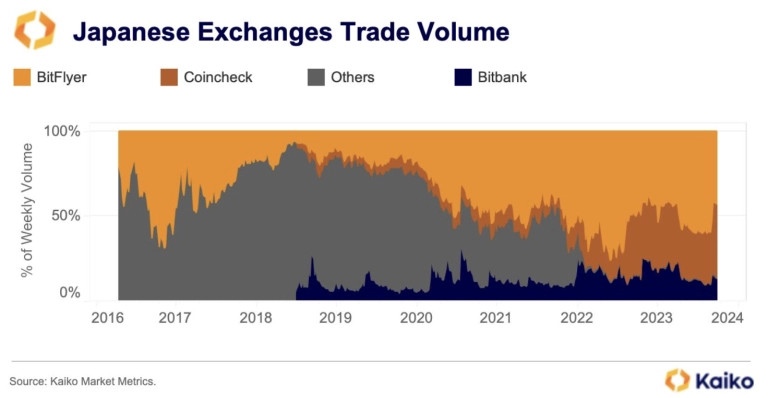The Ambitious Agenda of Japanese Politician Ishiba: A Blockchain-Driven Economic Transformation
In Brief
With Ishiba stepping into the prime ministerial role, he aims to capitalize on advancements in blockchain and non-fungible tokens (NFTs) to revitalize Japan's economy, marking a crucial technological evolution for the nation.

As Shigeru Ishiba, Japan's newly elected prime minister, unveils ambitious plans to harness blockchain technology and NFTs to stimulate the economy, the country stands at a pivotal junction in technological advancement, representing a transformative moment in its long history with cryptocurrencies and digital assets.
Ishiba’s Proposal for a Digital Japan
Shigeru Ishiba, who has previously served as Japan's Defense Minister and is now the newly appointed president of the Liberal Democratic Party (LDP), is poised to assume the role of Prime Minister shortly. His ascent reflects a growing recognition of how emerging technologies will shape Japan's economic trajectory moving forward.
In a recent announcement, Ishiba expressed his vision to employ NFTs and blockchain technologies as catalysts for economic prosperity, particularly focusing on enhancing local communities. He stated, "Our goal is to re-establish the value of various traditional goods, including culinary delights and tourism experiences, through blockchain and NFTs, aligning them with global market valuations.\" policy statement .
This forward-thinking approach aligns with demands from cryptocurrency advocacy groups seeking to utilize NFTs and decentralized autonomous organizations (DAOs) to rejuvenate economically struggling rural areas. Ishiba's administration is dedicated to unveiling new avenues for revenue generation while showcasing Japan’s diverse regional offerings through the digitization of local assets and experiences.
Ishiba plans to appoint Masaaki Taira, the current head of the LDP’s web3 task force, as the new Minister of Digital Affairs, highlighting his commitment to ushering in this digital revolution. Taira appears to firmly advocate for the integration of blockchain and NFT technology across various sectors of the Japanese economy, based on his expertise and past comments.
A New Digital Affairs Minister
Taira has passionately argued for the potential of NFTs to enhance the global standing of Japanese intellectual property. He has also pointed out the urgent need for tax reforms aimed at supporting crypto innovators, asserting that the current taxation framework is "not conducive\" to businesses in this evolving landscape, especially for those dealing with more obscure cryptocurrencies.
Recognizing the challenges faced by nascent ventures in the cryptocurrency sector, particularly related to the scrutiny of their token assets, Taira’s potential appointment signals a notable shift towards fostering a more conducive environment for blockchain and NFT innovation in Japan.
A Historical Look: Japan's Journey Through the Crypto Landscape
To grasp the significance of this legislative shift, it's crucial to revisit Japan's rocky journey within the world of cryptocurrency. Despite facing some significant obstacles, Japan has emerged as a pioneer in the adoption and regulation of cryptocurrencies.
The nation experienced two of the most notorious cyberattacks on cryptocurrency exchanges in history.
The most infamous incident was the 2014 hacking of Mt. Gox, which at its peak was the world’s largest Bitcoin exchange, leading to the loss of around 7% of the total Bitcoin supply. As a result of these incidents, Japanese regulators had to dive into the crypto domain much sooner than their global peers, which prompted a more cautious approach towards the governance of digital assets. Despite these setbacks, Japan was among the first nations to establish a comprehensive regulatory framework for cryptocurrency assets. The Role of the Japanese Yen in Cryptocurrency Dynamics

Photo: Kaiko
The trading patterns involving JPY (Japanese Yen) on exchanges reflect the domestic perspective towards cryptocurrencies. At one time, the trading volume in JPY surpassed that of the USD, highlighting the initial enthusiasm Japanese investors had for digital currencies. However, regulatory hurdles and unfavorable tax conditions have hampered the growth of Japan’s crypto market in comparison to other regions in recent times.
The challenges within Japan's crypto market are evident in the struggle faced by local exchanges to compete with global giants like Binance in terms of trading volume, particularly following the onset of the COVID-19 pandemic. Nevertheless, established exchanges such as BitFlyer have managed to maintain their dominance in the domestic arena.
In the realm of cryptocurrency regulation, Japan has taken a leadership role in recent years.
New regulations surrounding stablecoins were introduced
Current Developments in Regulation
through an amendment to the Payment Services Act that took effect in June 2022. These changes underscore Japan’s unwavering commitment to creating a stable and secure environment for the realm of digital assets, with the new rules coming into play on June 1, 2023. There has also been a surge of interest in security tokens, often referred to as digital securities. Recent updates to significant laws have streamlined the entry of financial institutions into this emerging sector, particularly focusing on digital corporate bonds and tokenized real estate equity. An important milestone was achieved in July 2021 when a division of the prominent real estate firm Kenedix spearheaded the first public offering of asset-backed security tokens in Japan, utilizing a blockchain-based trust mechanism for issuing beneficiary certificates.
Japan has also embraced the global NFT phenomenon. In the nation, NFT representations of digital artistry and trading cards have surged in popularity, with certain works fetching eye-popping prices. The unique characteristic of NFTs, which creates one-of-a-kind data driven by blockchain tech, has captivated both investors and creatives alike.
The rising appeal of NFTs aligns perfectly with Ishiba’s vision of leveraging these digital assets to promote regional craftsmanship and experiences. By tokenizing local specialties, from artisanal crafts to exquisite culinary offerings, Japan could unlock fresh markets and revenue streams for its diverse local economies.
The Rise of NFTs in Japan
The growing emphasis on NFTs and blockchain technology in Japan may carry significant implications on a global scale. As a technological powerhouse and one of the world’s leading economies, Japan's initiatives often resonate with trends and developments across nations, particularly in Asia.
If successful, Japan's innovative use of blockchain and NFTs for economic enrichment might inspire other countries to incorporate similar technologies into their own development strategies. It might also shift the global landscape of crypto and NFT markets, inducing greater activity and innovation on home-ground platforms in Japan.
Moreover, Japan’s regulatory approach towards these technologies might set a benchmark globally. As countries around the world navigate the complexities of digital asset regulation, Japan’s experiences could provide valuable lessons.
Furthermore, please be aware that the content on this page is not meant to serve as legal, tax, investment, or financial advice. It’s crucial to only invest what you can afford to lose, and to seek independent financial counsel if you have any uncertainty. For more details, kindly refer to the terms and conditions and support resources provided by the issuer or promoter. MetaversePost is dedicated to delivering accurate and unbiased reporting, but market dynamics may change without prior notice.
Victoria is a distinguished writer, covering diverse technology topics such as Web 3.0, artificial intelligence, and cryptocurrencies. Her wealth of experience positions her to craft insightful narratives for a broader audience.
Disclaimer
In line with the Trust Project guidelines Gate Dubai Achieves Complete Operational Licensing From VARA, Broadening Its Regulatory Footprint in the Middle East







